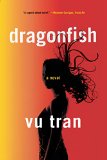Summary | Excerpt | Reviews | Beyond the Book | Readalikes | Genres & Themes | Author Bio

A Novel
by Vu TranExcerpt
Dragonfish
When Suzy left me, it was easy at first. No children. No possessions to split up. No one really to care. I was an only child, my parents both years in their graves, and her entire family was either also dead or still in Vietnam. After eight years together, I'd gotten to know maybe two or three of her friends, and the only things my police buddies knew about her was her name and her temper.
She gave me the news after Sunday dinner. I was sitting at the dining table, and she approached me from the kitchen, her mouth still swollen, and said, "I'm leaving tomorrow and I'm taking my clothes. You can have everything else." She carried away my -half--empty plate and I heard it shatter in the sink.
The first time I met her, I knew she was fearless. I was responding to a robbery at the flower shop where she worked. She'd been in America almost a decade, but her English was still pretty bad. When I arrived, she stood at the door with a baseball bat in one hand and bloody pruning shears in the other. Before I could step out of the patrol car, she flew into a tirade about what had happened, as though I'd been the one who robbed her. I understood about a quarter of what she said—something about a gun and ruined roses—but I knew I liked her. That petite sprightly body. Her lips, her cheekbones: full and bold. Firecracker eyes that glared at people with the urgency of a lit fuse. We found the perp two miles away, limping and bleeding from a stab wound to his thigh. The pruning shears had done it. Suzy and I married four months later.
I was -thirty--five then, an age when I once thought I should already have two or three kids, though I suspected she, at -thirty--three, had given little thought to her own biology, let alone the passage of time. When I proposed, she agreed on the spot, but only if I was okay with not having children. She was not good with kids, she said, and having them would hurt too much, two reasons she repeated when I brought it up again a year later and a third time the year after that. I always figured she'd eventually change her mind.
Her real name was Hong, which meant "pink" or "rose" in Vietnamese. But it sounded a bit piggish the way Americans pronounced it, so I suggested the name of my first girlfriend in high school, and this she did give me, though her Vietnamese acquaintances still called her Hong.
When we married, neither of us seemed to have any worldly possessions beyond our clothes and the car we drove. It was like we had both, up until the time we met, lived our adulthoods at some cheap motel, so that we knew nothing about domesticated life beyond paying bills and doing laundry. We combined all our savings and bought an old townhouse near Chinatown that I repainted and she furnished—a luxury she'd apparently never had and one she indulged in with care and sincerity, down to the crucifixes that adorned every room and the two brass hooks on the wall of the entryway, the one for my coat a little higher than hers.
In our first year, we bonded over this novelty of owning a home, of living with another human being and building a -brand--new life together with chairs and tables and dishes and bath towels. We were happy, I realize now, not because of what we actually had in common, but because we were fashioning this new life out of things that had never existed for either of us.
I'd stop by the flower shop every afternoon during my patrol to visit her. We had two days of the week together, and we spent it fixing up the townhouse, exploring local consignment shops, trying out every cheap restaurant in Chinatown, then going to the movies (Westerns and old -black--and--white detective films were her favorite) or walking the waterfront, where the smell of the ocean reminded her of Vietnam. For a long time I didn't mind losing myself in her world: the Vietnamese church, the food, the sappy ballads on the tape player, her handful of "friends" who with the exception of Happy hardly spoke a lick of English, even the morbid altar in the corner of the living room with the gruesome crucifix and the candles and pictures of dead people she never talked about. That was all fine, even wonderful, because being with her was like discovering a new, unexpected person in myself.
Excerpted from Dragonfish by Vu Tran. Copyright © 2015 by Vu Tran. With permission of the publisher, W. W. Norton & Company, Inc. All rights reserved.
Your guide toexceptional books
BookBrowse seeks out and recommends the best in contemporary fiction and nonfiction—books that not only engage and entertain but also deepen our understanding of ourselves and the world around us.